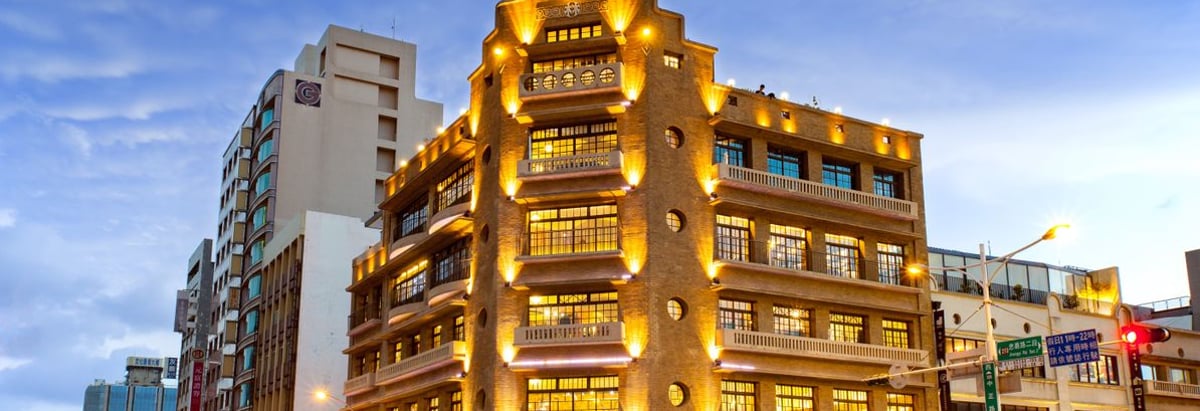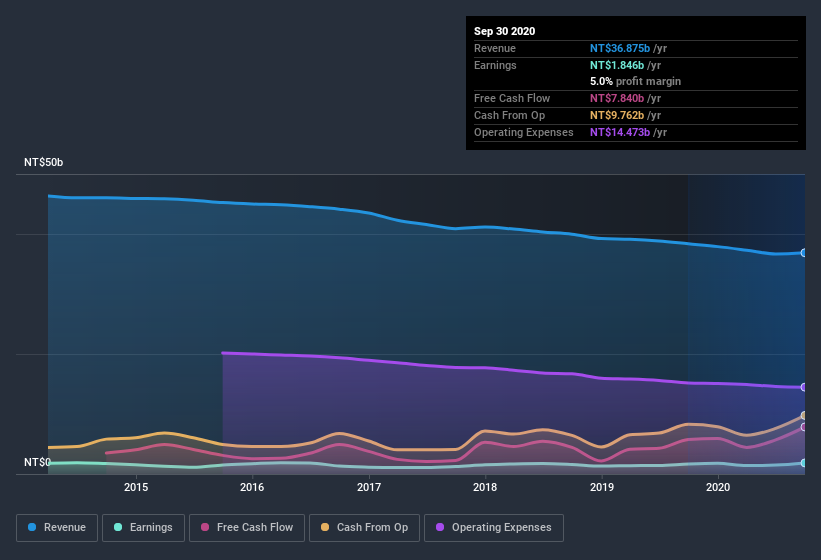Is There More To The Story Than Far Eastern Department Stores's (TPE:2903) Earnings Growth?

It might be old fashioned, but we really like to invest in companies that make a profit, each and every year. Having said that, sometimes statutory profit levels are not a good guide to ongoing profitability, because some short term one-off factor has impacted profit levels. In this article, we'll look at how useful this year's statutory profit is, when analysing Far Eastern Department Stores (TPE:2903).
While Far Eastern Department Stores was able to generate revenue of NT$36.9b in the last twelve months, we think its profit result of NT$1.85b was more important. Even though its revenue is down over the last three years, its profit has actually increased, as you can see, below.
View our latest analysis for Far Eastern Department Stores

Not all profits are equal, and we can learn more about the nature of a company's past profitability by diving deeper into the financial statements. As a result, today we're going to take a closer look at Far Eastern Department Stores' cashflow, and unusual items, with a view to understanding what these might tell us about its statutory profit. Note: we always recommend investors check balance sheet strength. Click here to be taken to our balance sheet analysis of Far Eastern Department Stores.
Examining Cashflow Against Far Eastern Department Stores' Earnings
As finance nerds would already know, the accrual ratio from cashflow is a key measure for assessing how well a company's free cash flow (FCF) matches its profit. In plain english, this ratio subtracts FCF from net profit, and divides that number by the company's average operating assets over that period. This ratio tells us how much of a company's profit is not backed by free cashflow.
Therefore, it's actually considered a good thing when a company has a negative accrual ratio, but a bad thing if its accrual ratio is positive. While having an accrual ratio above zero is of little concern, we do think it's worth noting when a company has a relatively high accrual ratio. That's because some academic studies have suggested that high accruals ratios tend to lead to lower profit or less profit growth.
Over the twelve months to September 2020, Far Eastern Department Stores recorded an accrual ratio of -0.10. That indicates that its free cash flow was a fair bit more than its statutory profit. Indeed, in the last twelve months it reported free cash flow of NT$7.8b, well over the NT$1.85b it reported in profit. Far Eastern Department Stores shareholders are no doubt pleased that free cash flow improved over the last twelve months. However, that's not all there is to consider. The accrual ratio is reflecting the impact of unusual items on statutory profit, at least in part.
How Do Unusual Items Influence Profit?
Far Eastern Department Stores' profit was reduced by unusual items worth NT$1.4b in the last twelve months, and this helped it produce high cash conversion, as reflected by its unusual items. This is what you'd expect to see where a company has a non-cash charge reducing paper profits. It's never great to see unusual items costing the company profits, but on the upside, things might improve sooner rather than later. When we analysed the vast majority of listed companies worldwide, we found that significant unusual items are often not repeated. And, after all, that's exactly what the accounting terminology implies. Assuming those unusual expenses don't come up again, we'd therefore expect Far Eastern Department Stores to produce a higher profit next year, all else being equal.
Our Take On Far Eastern Department Stores' Profit Performance
In conclusion, both Far Eastern Department Stores' accrual ratio and its unusual items suggest that its statutory earnings are probably reasonably conservative. Based on these factors, we think Far Eastern Department Stores' earnings potential is at least as good as it seems, and maybe even better! If you'd like to know more about Far Eastern Department Stores as a business, it's important to be aware of any risks it's facing. At Simply Wall St, we found 3 warning signs for Far Eastern Department Stores and we think they deserve your attention.
After our examination into the nature of Far Eastern Department Stores' profit, we've come away optimistic for the company. But there is always more to discover if you are capable of focussing your mind on minutiae. Some people consider a high return on equity to be a good sign of a quality business. So you may wish to see this free collection of companies boasting high return on equity, or this list of stocks that insiders are buying.
If you decide to trade Far Eastern Department Stores, use the lowest-cost* platform that is rated #1 Overall by Barron’s, Interactive Brokers. Trade stocks, options, futures, forex, bonds and funds on 135 markets, all from a single integrated account. Promoted
New: AI Stock Screener & Alerts
Our new AI Stock Screener scans the market every day to uncover opportunities.
• Dividend Powerhouses (3%+ Yield)
• Undervalued Small Caps with Insider Buying
• High growth Tech and AI Companies
Or build your own from over 50 metrics.
This article by Simply Wall St is general in nature. It does not constitute a recommendation to buy or sell any stock, and does not take account of your objectives, or your financial situation. We aim to bring you long-term focused analysis driven by fundamental data. Note that our analysis may not factor in the latest price-sensitive company announcements or qualitative material. Simply Wall St has no position in any stocks mentioned.
*Interactive Brokers Rated Lowest Cost Broker by StockBrokers.com Annual Online Review 2020
Have feedback on this article? Concerned about the content? Get in touch with us directly. Alternatively, email editorial-team (at) simplywallst.com.
About TWSE:2903
Far Eastern Department Stores
Operates department stores and supermarkets in Taiwan.
Established dividend payer with adequate balance sheet.
Market Insights
Community Narratives



